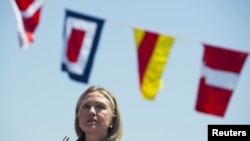BATUMI, Georgia - U.S. Secretary of State Hillary Clinton says the Obama administration is continuing to push Russia to withdraw its troops from the breakaway Georgian republics of Abkhazia and South Ossetia. Clinton met with Georgian leaders in Black Sea port of Batumi, to discuss defense, democracy, and investment.
Secretary Clinton says the United States remains steadfast in its support for Georgia's sovereignty and territorial integrity.
"We reject Russia's occupation and militarization of Georgian territory and we call on Russia to fulfill its obligations under the 2008 cease-fire agreement, including withdrawal of its forces to pre-conflict positions and allowing free access for humanitarian assistance."
Russian troops remain in Abkhazia and South Ossetia, neither of which are recognized as autonomous republics by most of the international community.
Clinton says the United States and Georgia are deepening their defense cooperation to strengthen both Georgian security and its operations in Afghanistan, where it is the largest non-NATO member of the international force.
Following talks with Prime Minister Nika Gilauri, Secretary Clinton said the key to Georgia's future is consolidating democratic gains that will bring it closer to joining both the European Union and NATO. She says this year's parliament elections and next year's presidential poll are opportunities to strengthen the legitimacy of democratic institutions in the eyes of Georgian voters and the world.
"We urge Georgia's leaders to ensure that it will be a competitive campaign and that elections are free and fair both on election day and in the months running up to it. The recent creation of an inter-agency task force to handle election-related grievances is a good step," she said.
Term limits prevent President Mikheil Saakashvili from running for re-election, but there is speculation that he may seek to become prime minister.
Secretary Clinton says Georgians made history with their Rose Revolution against fraudulent elections in 2003. But the more difficult, and she calls ultimately more important work, may well be ahead - building the habits and practices that sustain democracy over time.
"That means not only holding successful elections, but going beyond elections and strengthening the other key pillars of democracy such as labor rights, judicial independence, media independence and access," she said.
She say the impact of these reforms go well beyond politics to boosting economic growth.
"As Georgia continues to strengthen accountability, transparency and the rule of law you will see even greater interest and investment in your economy," she said.
Clinton's time in the South Caucuses also includes stops in Armenia and Azerbaijan, where she has expressed concern about violence across the zone that has divided the countries since the end of the Nagorno-Karabakh war in 1994.
Secretary Clinton says the United States remains steadfast in its support for Georgia's sovereignty and territorial integrity.
"We reject Russia's occupation and militarization of Georgian territory and we call on Russia to fulfill its obligations under the 2008 cease-fire agreement, including withdrawal of its forces to pre-conflict positions and allowing free access for humanitarian assistance."
Russian troops remain in Abkhazia and South Ossetia, neither of which are recognized as autonomous republics by most of the international community.
Clinton says the United States and Georgia are deepening their defense cooperation to strengthen both Georgian security and its operations in Afghanistan, where it is the largest non-NATO member of the international force.
Following talks with Prime Minister Nika Gilauri, Secretary Clinton said the key to Georgia's future is consolidating democratic gains that will bring it closer to joining both the European Union and NATO. She says this year's parliament elections and next year's presidential poll are opportunities to strengthen the legitimacy of democratic institutions in the eyes of Georgian voters and the world.
"We urge Georgia's leaders to ensure that it will be a competitive campaign and that elections are free and fair both on election day and in the months running up to it. The recent creation of an inter-agency task force to handle election-related grievances is a good step," she said.
Term limits prevent President Mikheil Saakashvili from running for re-election, but there is speculation that he may seek to become prime minister.
Secretary Clinton says Georgians made history with their Rose Revolution against fraudulent elections in 2003. But the more difficult, and she calls ultimately more important work, may well be ahead - building the habits and practices that sustain democracy over time.
"That means not only holding successful elections, but going beyond elections and strengthening the other key pillars of democracy such as labor rights, judicial independence, media independence and access," she said.
She say the impact of these reforms go well beyond politics to boosting economic growth.
"As Georgia continues to strengthen accountability, transparency and the rule of law you will see even greater interest and investment in your economy," she said.
Clinton's time in the South Caucuses also includes stops in Armenia and Azerbaijan, where she has expressed concern about violence across the zone that has divided the countries since the end of the Nagorno-Karabakh war in 1994.




